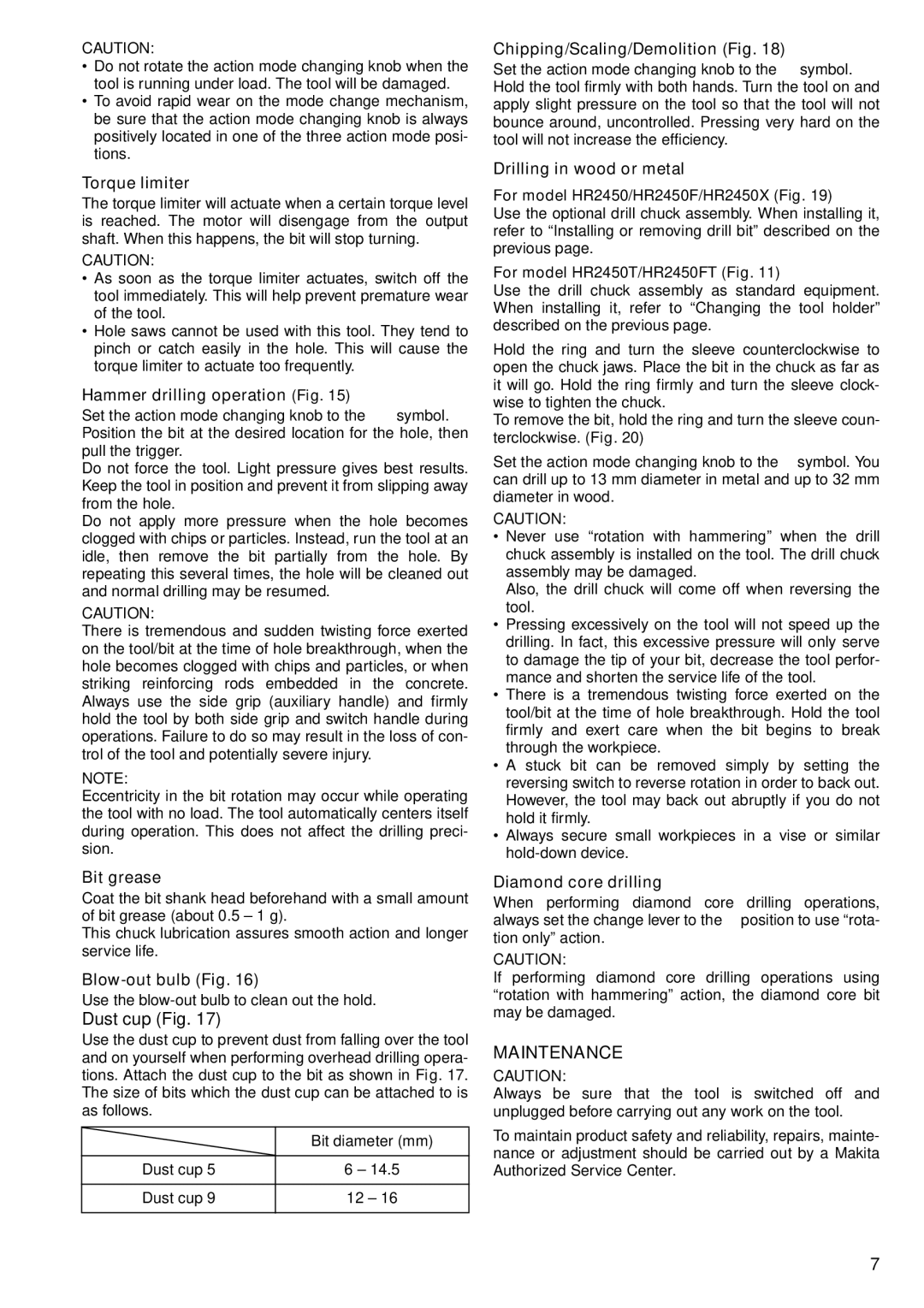CAUTION:
•Do not rotate the action mode changing knob when the tool is running under load. The tool will be damaged.
•To avoid rapid wear on the mode change mechanism, be sure that the action mode changing knob is always positively located in one of the three action mode posi- tions.
Torque limiter
The torque limiter will actuate when a certain torque level is reached. The motor will disengage from the output shaft. When this happens, the bit will stop turning.
CAUTION:
•As soon as the torque limiter actuates, switch off the tool immediately. This will help prevent premature wear of the tool.
•Hole saws cannot be used with this tool. They tend to pinch or catch easily in the hole. This will cause the torque limiter to actuate too frequently.
Hammer drilling operation (Fig. 15)
Set the action mode changing knob to the H symbol. Position the bit at the desired location for the hole, then pull the trigger.
Do not force the tool. Light pressure gives best results. Keep the tool in position and prevent it from slipping away from the hole.
Do not apply more pressure when the hole becomes clogged with chips or particles. Instead, run the tool at an idle, then remove the bit partially from the hole. By repeating this several times, the hole will be cleaned out and normal drilling may be resumed.
CAUTION:
There is tremendous and sudden twisting force exerted on the tool/bit at the time of hole breakthrough, when the hole becomes clogged with chips and particles, or when striking reinforcing rods embedded in the concrete. Always use the side grip (auxiliary handle) and firmly hold the tool by both side grip and switch handle during operations. Failure to do so may result in the loss of con- trol of the tool and potentially severe injury.
NOTE:
Eccentricity in the bit rotation may occur while operating the tool with no load. The tool automatically centers itself during operation. This does not affect the drilling preci- sion.
Bit grease
Coat the bit shank head beforehand with a small amount of bit grease (about 0.5 – 1 g).
This chuck lubrication assures smooth action and longer service life.
Use the
Dust cup (Fig. 17)
Use the dust cup to prevent dust from falling over the tool and on yourself when performing overhead drilling opera- tions. Attach the dust cup to the bit as shown in Fig. 17. The size of bits which the dust cup can be attached to is as follows.
| Bit diameter (mm) |
|
|
Dust cup 5 | 6 – 14.5 |
|
|
Dust cup 9 | 12 – 16 |
|
|
Chipping/Scaling/Demolition (Fig. 18)
Set the action mode changing knob to the g symbol. Hold the tool firmly with both hands. Turn the tool on and apply slight pressure on the tool so that the tool will not bounce around, uncontrolled. Pressing very hard on the tool will not increase the efficiency.
Drilling in wood or metal
For model HR2450/HR2450F/HR2450X (Fig. 19)
Use the optional drill chuck assembly. When installing it, refer to “Installing or removing drill bit” described on the previous page.
For model HR2450T/HR2450FT (Fig. 11)
Use the drill chuck assembly as standard equipment. When installing it, refer to “Changing the tool holder” described on the previous page.
Hold the ring and turn the sleeve counterclockwise to open the chuck jaws. Place the bit in the chuck as far as it will go. Hold the ring firmly and turn the sleeve clock- wise to tighten the chuck.
To remove the bit, hold the ring and turn the sleeve coun- terclockwise. (Fig. 20)
Set the action mode changing knob to the m symbol. You can drill up to 13 mm diameter in metal and up to 32 mm diameter in wood.
CAUTION:
•Never use “rotation with hammering” when the drill chuck assembly is installed on the tool. The drill chuck assembly may be damaged.
Also, the drill chuck will come off when reversing the tool.
•Pressing excessively on the tool will not speed up the drilling. In fact, this excessive pressure will only serve to damage the tip of your bit, decrease the tool perfor- mance and shorten the service life of the tool.
•There is a tremendous twisting force exerted on the tool/bit at the time of hole breakthrough. Hold the tool firmly and exert care when the bit begins to break through the workpiece.
•A stuck bit can be removed simply by setting the reversing switch to reverse rotation in order to back out. However, the tool may back out abruptly if you do not hold it firmly.
•Always secure small workpieces in a vise or similar
Diamond core drilling
When performing diamond core drilling operations, always set the change lever to the mposition to use “rota- tion only” action.
CAUTION:
If performing diamond core drilling operations using “rotation with hammering” action, the diamond core bit may be damaged.
MAINTENANCE
CAUTION:
Always be sure that the tool is switched off and unplugged before carrying out any work on the tool.
To maintain product safety and reliability, repairs, mainte- nance or adjustment should be carried out by a Makita Authorized Service Center.
7
